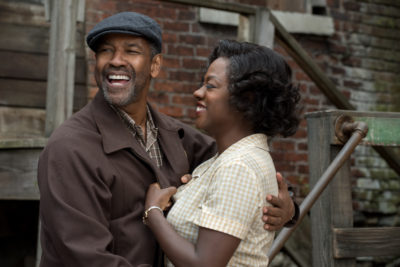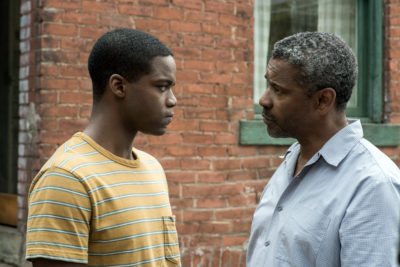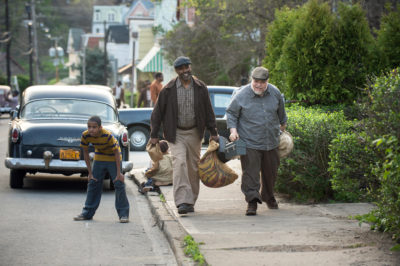
Denzel Washington plays Troy Maxson and Viola Davis plays Rose Maxson in Fences from Paramount Pictures. Directed by Denzel Washington from a screenplay by August Wilson.
August Wilson’s play Fences is a timeless – and therefore timely – story about an African American man dealing with race relations, marriage, fatherhood and a past that was never quite what he wanted it to be.
Troy Maxson (Denzel Washington) is a garbage collector. He has an eighteen-year marriage to the devoted Rose (Viola Davis) and two sons – Lyons (Russell Hornsby), his son from a previous marriage, who has moved out and is trying to make it as a musician while his girlfriend supports them with a job in a hospital; and Cory (Jovan Adepo), a high school senior who’s been scouted by a college university football team.
His brother, Gabriel (Mykelti Williamson), suffered brain damage in WWII and now believes himself to be the Gabriel who will sound his horn at the battle of Armageddon – and whose horn will tell Saint Peter to open the gates of heaven.
Troy is the kind of guy who believes in speaking his mind – he gets a promotion when he complains about garbage trucks being driven by whites while ‘coloreds’ have to do all the lifting – and being responsible.
He and his friend Bono (Stephen McKinley Henderson) get together often – usually in Troy’s backyard, to have a drink and shoot the breeze. Tall tales are part of it – though Troy insists they’re truth.
He also longs for a past in which he could have made it in major league baseball, though that’s a dream that could never have come true, and puts down Jackie Robinson for not being as good as he was.

Denzel Washington plays Troy Maxson and Jovan Adepo plays Cory in Fences from Paramount Pictures. Directed by Denzel Washington from a screenplay by August Wilson.
His failing to get to the big leagues colors his opinions about Cory’s chances to play college ball – and he refuses to sign permission papers for Cory to do so.
Eventually, he oversteps his bounds in an event that does irreparable harm to his family.
Fences was directed by Denzel Washington from a screenplay by the late August Wilson (from his stage play). While it is a powerful piece with almost Shakespearean monologues (soliloquies, really), and folksy stories, it’s also an intense inspection of this proud man’s fall from grace.
Troy’s fall from grace comes because, as small a world as he lives in, he has to be top dog. Whether he’s engaged in banter with Bono; ragging on Lyons about his lack of a proper job, or not letting Cory consider college ball, it’s he who decides. His word is LAW.
The fences of the film’s title refer to both a fence Troy is building around his yard and the one he has already built around himself to keep his opinion of himself from flagging in the face of the events from his life.
The tricky thing about fences, notes Bono, is that they keep some people out, but they keep some people in – which gives us a third fence: the one that keeps Troy’s family inside one and just outside another.
When Troy does lose his way and that takes that one misstep that alienates even his faithful Rose, it’s because the metaphorical fences he’s built have rendered him unable to see her as anything but an extension of himself. It’s no wonder that she takes the actions she does.

Denzel Washington plays Troy Maxson and Stephen McKinley Henderson plays Jim Bono in Fences from Paramount Pictures. Directed by Denzel Washington from a screenplay by August Wilson.
While race relations are only obliquely mentioned – Troy insists that Cory would never get to actually play college ball because the coach would always favor whites and his situation at work being the two biggest allusions – it’s interesting that when he complains about only white guys driving the garbage trucks and receives his promotion, it doesn’t change anything at all for him.
No, it’s all about him getting what he deserved (and it’s about time) and everyone else is still getting screwed.
While Washington captures every bit of Troy’s rage, frustration and sense of responsibility, Fences works because as a director, he allows Troy’s vanity to be punctured when he does go astray – and because he has given Adepo and Davis the opportunity to vent their own frustrations (that Troy never really listens to anyone but his old friend Bono – and then only just – is only because Bono indulges him by supporting him).
Davis plays Rose like she knows every fault her man has and loves him as much because of them as in spite of them. Her moments of righteous anger are earned – and when Frank makes his fatal misstep, her cold, quiet responses are more powerful than any volcanic raging.
The only real problem with Fences is that, despite Washington’s efforts to open it up by using a few different locations, it is still very much a play in every other respect. It often feels like there’s too much speechifying, but seeing and hearing this cast put such real emotion into their exchanges almost completely balances that out.
Aside from the film itself, Fences’ major problem is being released on Christmas Day at the end of an over packed awards season.
It’s not (quite) one of the best films of the year, but it has two performances that rank among the best.
Final Grade: A-